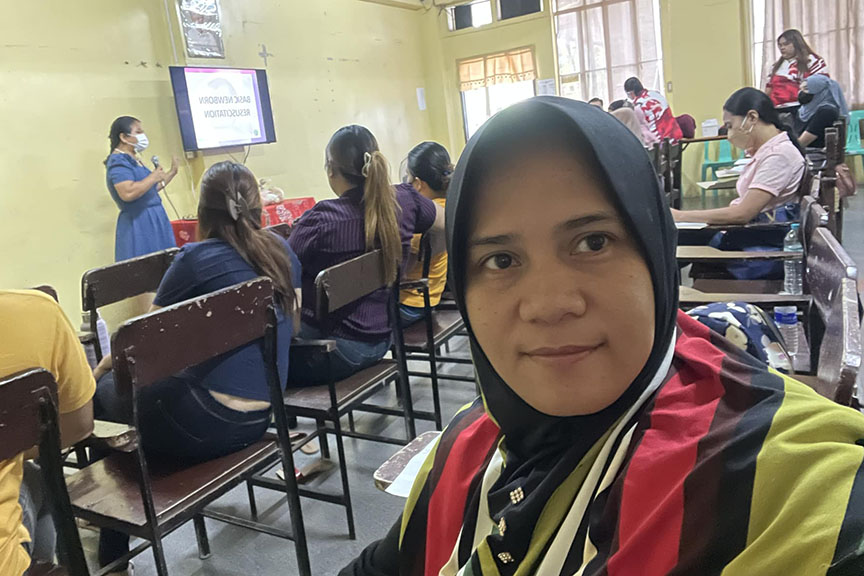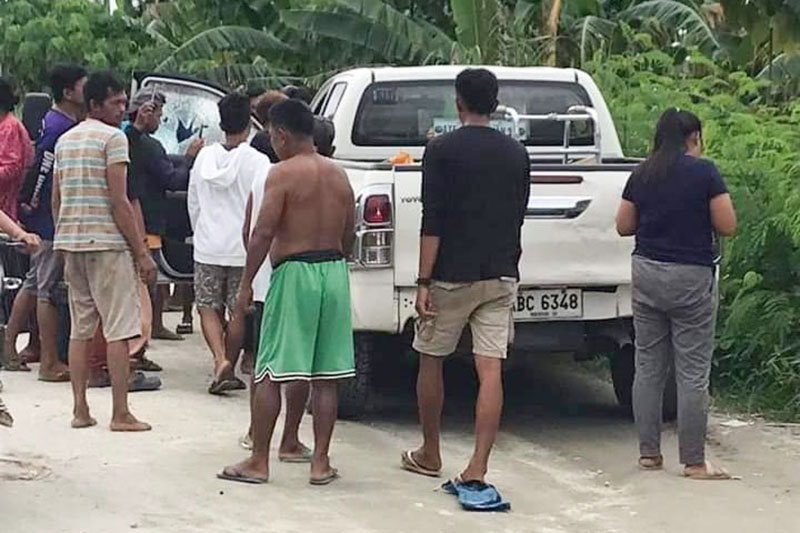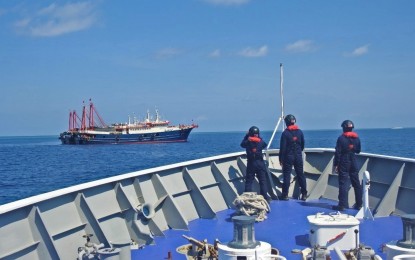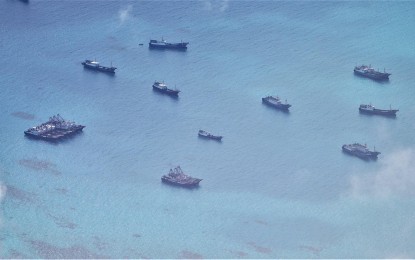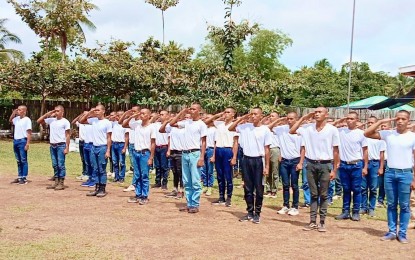From the Philippine News Agency (Jul 12, 2023): OPAPRU: Marcos admin committed to sustaining 'peace gains' (By Priam Nepomuceno)
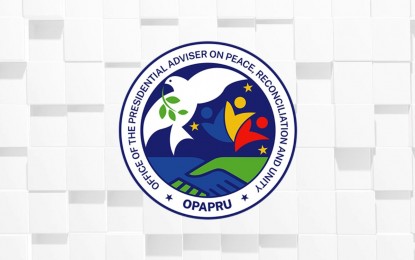
MANILA –
The Marcos Administration is determined to continue building on the gains of the comprehensive Philippine peace process, sustaining its momentum, and pushing forward the implementation of all signed peace agreements.
“With only a year after he assumed the highest post in the land, President (Ferdinand R.) Marcos has demonstrated his steadfast commitment to the country’s comprehensive peace process, as reflected in the major milestones achieved under his administration,” Office of the Presidential Adviser on Peace, Reconciliation and Unity (OPAPRU) Secretary Carlito Galvez Jr. said in a statement Wednesday.This came as President Ferdinand R. Marcos Jr. is set to deliver his second State of the Nation Address (SONA) on July 24.
Galvez said the government’s Five-Point Peace, Reconciliation and Unity Agenda is anchored on a whole-of-nation, whole-of-society approach wherein all sectors of society have a vital role to play in the peacebuilding and development process.
“As evidenced by the President’s banner of unity, he has emphasized, time and again, that no one will be left behind. Each and every Filipino can help push forward and benefit from the successful implementation of the nation’s peace process,” the OPAPRU chief added.
Galvez also pointed out that under the Bangsamoro peace process, the government has helped reunite two of the country’s major Moro fronts – the Moro Islamic Liberation Front (MILF) and Moro National Liberation Front (MNLF) after years of separation.
“As members of the Bangsamoro Transition Authority (BTA), the MILF and MNLF have let go of past animosities and are now working side by side in order to help uplift the lives of their people,” he added.And through the normalization program under the Comprehensive Agreement on the Bangsamoro (CAB), Galvez said the national government shall fast-track the transformation of MILF combatants, their families and communities through the decommissioning process.Nearly 25K MILF combatants ‘decommissioned’
“To date, a total of 24,844 MILF combatants have successfully undergone the process of decommissioning (Phases 1 to 3), which is a vital component of the peace agreement,” Galvez said.
To aid these decommissioned combatants in their transition, he said the government is also providing them with socioeconomic assistance packages, as six of their camps are being transformed into zones of peace and development.The government has so far provided PHP2.48 billion worth of transitional cash assistance to decommissioned combatants apart from in-kind packages such as civil registration, livelihood packages, skills training, employment support programs and community infrastructure.
Zones of peace, development
Another major development under the Bangsamoro peace process, Galvez said, is the first meeting held between the Government of the Philippine and MILF Peace Implementing Panels under the Marcos administration.
“During the meeting held last July 1, the GPH and MILF panels reaffirmed their commitment to the implementation of the Comprehensive Agreement on the Bangsamoro (CAB), which was contained in a joint statement issued by both parties,” he said.
Under the peace process with the MNLF, Galvez said the government is focused on fulfilling the remaining commitments made under the 1996 Final Peace Agreement it signed with the Moro group.
Among these commitments, he said, is the rollout of a transformation program for MNLF members, their families and communities that seeks to improve the quality of life of the people and turn their areas into zones of peace and development.“Through the peace coordinating committees we have jointly set up with MNLF leaders, we will ensure that our MNLF brothers and sisters shall be able to partake of the dividends of peace and development,” Galvez said.
Transformation Program
To realize these aspirations, the OPAPRU recently signed a Memorandum of Agreement with the Mindanao State University System to roll out the initial interventions for the combatants and their communities under the MNLF Transformation Program.
As a result of the various development and peacebuilding interventions being carried out jointly by the national government and BARMM governments, the Bangsamoro has become one of the fastest-growing regions not only in Mindanao but in the country.According to the Philippine Statistics Agency (PSA), the BARMM’s economic performance increased by an impressive 7.5 percent in 2021 and recorded the second-fastest growth rate among all regions nationwide.
The top industries that registered the highest growths rates included human health and social work activities (22.2 percent); mining and quarrying (20.2 percent); accommodation and food service activities, (17.9 percent); construction (12.2 percent); and financial and insurance activities (10.6 percent).
PSA data also showed that the BARMM ranked first in fishery production volume, with the region producing 4.25 million metric tons in 2021 and 4.34 million metric tons in 2022.
Petroleum service, coal operating contracts
As a testament to his full support of the BARMM’s development, the President witnessed on July 6, the signing of the Intergovernmental Energy Board (IEB) Circular on the Joint Award of Petroleum Service Contracts (PSCs) and Coal Operating Contracts (COCs) in the BARMM, which marks another major milestone in the Bangsamoro peace process.
The IEB Circular operationalizes the provision in Section 10, Article XIII of Republic Act 11054 or the Organic Law for the Bangsamoro Autonomous Region, to jointly grant rights, privileges, and concessions for the exploration, development, and utilization of uranium and fossil fuels such as petroleum, natural gas, and coal within the territorial jurisdiction of the Bangsamoro.
The circular aims to boost economic development and draw foreign capital into the region.
Marcos said the country would not be as dependent on external fuel sources, as the IEB circular will help unleash BARMM’s energy potential and attract vital investments to the area.
"By harnessing the enormous energy potential within BARMM, we will reduce our reliance on external sources, mitigate the detrimental impacts of price fluctuations, and build a solid foundation for our country's energy security," he said.
Local Peace Engagement
To finally put an end to the decades-long communist insurgency in the country, Galvez said the government is implementing a revitalized Local Peace Engagement (LPE) initiative, as well as a Transformation Program for former rebels (FRs), their families and communities.
“The strength of LPE primarily lies in its community-based, community-driven approach wherein all members of the community, particularly local government units and the residents themselves, are actively involved in the peacebuilding process.”The LPE is among the 12 lines of effort of the National Task Force to End Local Communist Armed Conflict (NTF-ELCAC), which aims to address the roots of the armed rebellion that has claimed countless lives and destroyed once thriving communities.
Since its launching in 2019, 90 local task forces were capacitated on the LPE guidelines, Conflict-Sensitivity and Peace Promoting (CSPP) approach, Women, Peace and Security (WPS), and Youth, Peace and Security (YPS).This aided in the crafting of 65 strategic LPE plans and organization of 22 local peace panels.
Moreover, 15 provinces developed their own transformation program plans and nine special project teams were formed to assist in the initiatives.
Galvez said the Marcos Administration is also committed to implementing a high-impact, cross-cutting transformation program that is now benefiting members of other revolutionary organizations who have given up the armed struggle and embraced a peaceful life.
These groups, he said, include the Cordillera Bodong Administration–Cordillera People’s Liberation Army (CBA-CPLA) and the Rebolusyonaryong Partido Manggagawa ng Pilipinas/Revolutionary Proletarian Army/Alex Boncayao Brigade-Tabara Paduano Group (RPM-P/RPA/ABB-TPG), now known as the "Kapatiran".“Through the Transformation Program we are carrying out for members of the CBA-CPLA and 'Kapatiran', the government is demonstrating its sincerity to aid these ex-fighters in improving their lives and helping them earn sustainable incomes,” Galvez said.
In June 2023, a 1.3 kilometer farm-to-market road project was inaugurated, providing improved accessibility and facilitating the relocation of 53 KAPATIRAN families to the congregated site in Sitio Binacay, Barangay Talacdan, Cauayan, Negros Occidental.During the nationwide turnover of housing units to 30,000 beneficiaries in December 2022, seven members of the "Kapatiran" were awarded with Transfer of Certificates of Title from the National Housing Authority.
The granting of land -- with full ownership and possession transferred to the former rebel beneficiaries -- is considered a major milestone in the history of the Philippine peace process.
Social healing
Under OPAPRU's Social Healing and Peacebuilding Program (SHAPE), Galvez said the government is helping individuals, families, and communities overcome trauma caused by armed conflict and build their resilience.
“The SHAPE Program is focused on implementing interventions such as peace forums, interfaith dialogues, and trauma healing sessions in order to address the root causes of violence and conflict in communities,” Galvez said.
To ensure that genuine peace and sustainable development go hand in hand, he said the Marcos administration continues to implement the "PAyapa at MAsaganang PamayaNAn" or "PAMANA" program parallel to the rigorous initiatives of the agency.
From 2011 to 2022, PAMANA has implemented projects worth Php 55.2 billion that have benefitted residents in 16 regions, 50 provinces and over 500 municipalities and cities in seven geographical zones nationwide.“Winning the peace can be achieved by promoting a more convergent delivery of goods and services, and addressing development challenges in conflict-affected and conflict-vulnerable areas nationwide,” Galvez said.This year, the PAMANA Program officially turned over a total of 71.6 kilometers of road projects and 309.7 meters of bridges in Alamada, Cotabato and Silvino Lubos, in Northern Samar.
By July 2023, PAMANA would have already turned over an additional PHP1.4 billion worth of road networks connecting the provinces of Agusan del Sur, Agusan del Norte, Surigao del Sur Surigao del Norte, and Butuan City.
Galvez also underscored that the government can only effectively implement all of these interventions with the full support of all stakeholders – line agencies, local government units, civil society, academe, the religious and security sector and the international donor community.
“All of the significant gains we have achieved under the comprehensive Philippine process are a result of all sectors of society working together and doing their part. The President recognizes the power of this collective effort and has vowed to harness it,” Galvez said.
https://www.pna.gov.ph/articles/1205440
